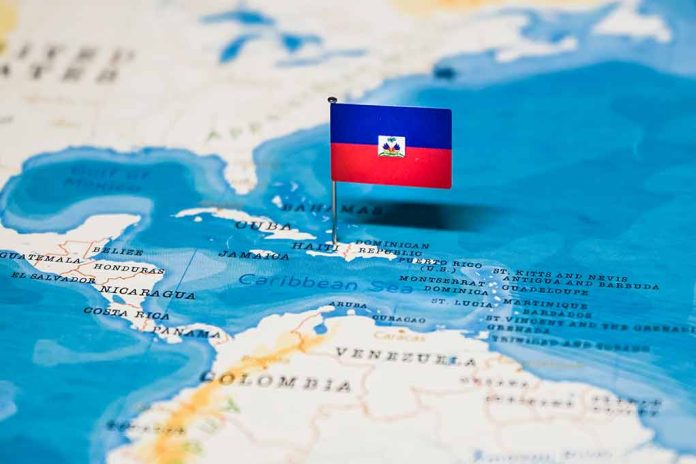
The United States dropped its push for the United Nations to turn a security mission in Haiti into a formal UN peacekeeping operation.
At a Glance
- The U.S. dropped its proposal for a U.N. peacekeeping mission in Haiti.
- A Kenyan-led policing mission has been extended until October 2, 2025.
- Haiti faces severe security challenges with gang violence controlling 80% of Port-au-Prince.
- Nearly 700,000 Haitians are homeless, and thousands have fled the country.
- The current mission struggles with funding and personnel shortages.
U.S. Shifts Strategy on Haiti Security Mission
In a significant policy shift, the United States has withdrawn its proposal to transform the current security mission in Haiti into a full-fledged UN peacekeeping operation. This decision comes amid ongoing violence and instability in the Caribbean nation, where armed gangs control large swaths of the capital, Port-au-Prince. The move has raised questions about the international community’s approach to addressing Haiti’s security crisis.
The U.N. Security Council has opted to extend the authorization of the multinational policing mission in Haiti, led by Kenya, until October 2, 2025. This extension, adopted unanimously, expresses deep concern about the violence, criminal activities, and mass displacement plaguing the country. However, it falls short of the more robust peacekeeping mission that some Haitian officials had hoped for.
Haitian Support for Peacekeeping Mission
Despite the U.S. decision, there remains strong support within Haiti for a more comprehensive peacekeeping effort. Edgard Leblanc, president of Haiti’s transitional presidential council, has publicly endorsed the idea of a U.N. peacekeeping mission to combat gang violence. This marks the first public support from a Haitian official since the U.S. initially proposed the mission.
“I am convinced that this change of status, whilst recognizing the errors of the past cannot be repeated, would guarantee the full success of the mission,” Leblanc said at the U.N. General Assembly.
Fils met with U.S. Secretary of State Antony Blinken to discuss the mission, underscoring the importance Haiti places on international support. However, the transformation of the current mission into a U.N. peacekeeping operation would require a vote by the U.N. Security Council, which experts reportedly believe is unlikely to pass.
The Russians and Chinese reportedly opposed the idea of the formal peacekeeping mission. Some have indicated that this is the reason the U.S. backed away from the plan, but according to Reuters, a senior official said, “We are being strategic about how we’re going about this and building on the shot of momentum that we heard from the Haitian president.”
Challenges Facing the Current Mission
The existing U.N.-backed mission in Haiti faces significant hurdles. Nearly 400 Kenyan officers and two dozen officers from Jamaica are currently on the ground, far short of the 2,500 personnel pledged by various countries. This shortfall highlights the chronic lack of funding and resources plaguing the operation.
“Although some of these missions have helped to temporarily stabilize the country, they also have left behind a heavy heritage,” Leblanc said.
The security situation in Haiti remains dire. Armed gangs control approximately 80% of Port-au-Prince, and violence has escalated since the assassination of President Jovenel Moïse in July 2021. In the first half of this year alone, over 3,600 people were killed in gang violence there. The crisis has led to the displacement of nearly 700,000 Haitians, with thousands fleeing the country altogether.
Looking Ahead: Haiti’s Uncertain Future
As Haiti grapples with these challenges, the international community must reassess its approach to supporting the nation’s security and stability. The extension of the current mission provides some continuity, but questions remain about its effectiveness given the limited resources and personnel. Haiti plans to hold elections by November despite the security concerns, adding urgency to the need for a comprehensive strategy to address the country’s ongoing crisis.
The situation in Haiti serves as a stark reminder of the complex interplay between international intervention, national sovereignty, and the pursuit of security and stability in fragile states. As the world watches, the effectiveness of the current approach and the potential need for more robust international engagement will likely remain subjects of intense debate and scrutiny.
Sources
- US changes tack on Haiti peacekeeping push amid China, Russia opposition
- UN authorizes Haiti security force for another year
- Haiti Says it Supports a UN Peacekeeping Mission to Fight the Country’s Violent Gangs
- Haiti says it supports a UN peacekeeping mission to fight the country’s violent gangs
- UN extends Kenya-led security mission in Haiti amid rising hunger, violence
- UN extends Haiti security mission for another year as violence soars














